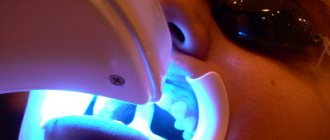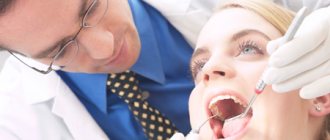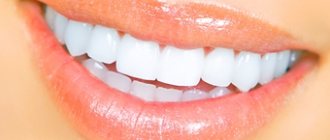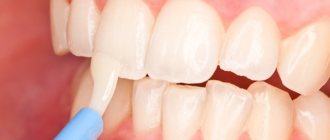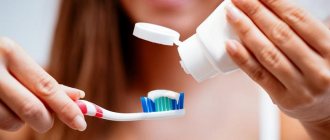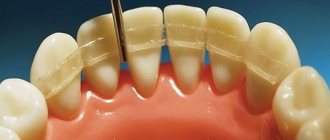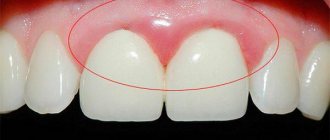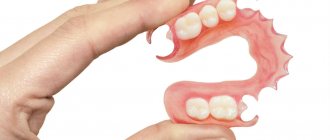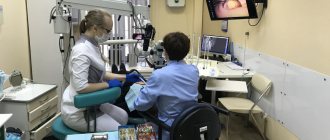To avoid having to resort to various types of prosthetics or implantation for as long as possible, experts recommend visiting a dental office for preventive purposes and treating caries and other dental diseases in a timely manner. In addition to these rules, oral hygiene is very important. Let's look at the dentist's general recommendations that will help you preserve your dental health for many years.
How to brush your teeth correctly
The most important rule is to maintain the duration of cleaning. On average, the manipulation should last 3 minutes, do not forget about the inner surface of the teeth. The brush must be guided from the gums to the edge of the tooth at a right angle; if you brush otherwise, you risk introducing bacteria and germs under the gum, as a result of which various diseases develop.
Do not try to create maximum pressure on the brush, you can damage your gums and cause them to bleed, and it will not make your teeth cleaner. Try not to put pressure on the brush; dentists recommend brushing your teeth gently, barely pressing on the brush.
You need to perform hygienic procedures at least 2 times a day - morning and evening. After eating, if possible, it is better to also cleanse; if this is not possible, use a mouth rinse.
Which toothbrush to choose
The choice of teeth cleaning tool is limited by the stiffness of the bristles. Recommendations from dentists agree:
- If there are no problems with teeth and gums, choose hard bristles.
- For sensitive enamel, give preference to medium hardness.
- If you have gum disease, it is better to choose a soft brush.
For hygienic purposes, do not use other people’s dental devices, even if we are talking about loved ones.
When choosing an electric device, choose a model with a 90-degree rotating head, this allows you to clean out food debris even in hard-to-reach places.
What is not recommended to do at home?
Often people try to save money and resort to traditional methods, in particular using soda or tooth powder to clean their teeth. Of course, the application gives some results, but it does not replace professional hygiene and it is impossible to remove plaque in hard-to-reach places with soda.
Other negative aspects of DIY whitening include:
- formation of microtraumas on the gums;
- violation of the integrity of the enamel, since aggressive compounds corrode and make it fragile, over time it becomes thinner;
- allergic reactions on the skin near the mouth are possible.
Damaged enamel increases tooth sensitivity, which greatly accelerates and causes the development of caries, and can even lead to the loss of a dental unit.
Teeth whitening using professional gels is another procedure that many try to perform at home, considering it absolutely safe. The procedure is truly harmless, provided that it is carried out under the guidance of an experienced specialist. By carrying out whitening without first consulting a dentist, you risk your health. Even in a clinical setting, not all procedures may be useful to you, and only a doctor, having fully examined the condition of the oral cavity, will choose the best option for you.
Contraindications to teeth whitening are:
- inflammatory processes in the gums;
- periodontitis;
- worn away tooth enamel.
Before whitening, treatment of the gums and teeth is always carried out, and only after that it is possible to begin to improve their aesthetic appearance.
Only a doctor can choose the appropriate method and the right preparation for whitening. When carrying out the procedure, it is necessary to take into account many factors, which cannot be done without special knowledge. Therefore, dentists advise not to experiment with your health, but to turn to professionals.
Recommendations for caring for braces and aligners
When wearing braces, in addition to standard hygiene procedures, you need to purchase a special device - a dental brush, which allows you to clean the space between the braces and tooth enamel.
Caring for your mouthguards varies slightly; they should be removed from your mouth when eating food to avoid damage. When brushing your teeth, the aligners are also removed and stored in a special container.
Let's consider a few more recommendations from dentists:
- After taking any food or drink, the mouthguard should be rinsed with warm water.
- The structure is cleaned twice a day using a soft brush and gel paste.
- Do not forget to carry out hygienic manipulations with the teeth themselves.
Dentists' advice after caries treatment
Treatment of caries involves applying a filling. To avoid disturbing the healed space, follow these guidelines:
- Avoid eating and drinking for 2 hours.
- Teeth brushing is carried out as usual without any changes.
- Limiting solid food for a day.
- For the first two weeks, avoid chewing gum so that the installed filling can fully take root.
If after treatment you are still bothered by toothache, you should visit a dentist for an in-person examination of the oral cavity.
Dentist's recommendations after tooth extraction
If for some reason you have a tooth removed, dentists give the following recommendations:
- If a high temperature occurs within 24 hours after removal, this may be a signal of the development of inflammation. In this case, you need to immediately see a dentist.
- During the first two days from the moment of medical intervention, take painkillers, anti-inflammatory and other medications as prescribed by the doctor.
- Avoid taking a hot bath for two days and limit physical activity.
- Avoid alcoholic drinks and smoking for at least several days.
- Rinse the mouth with antiseptic solutions (as prescribed by a doctor).
- Brush your teeth carefully with a soft brush, it is very important not to damage the injured area.
- Do not eat for 3 hours, then start with warm ground food or puree.
- Try not to touch the tooth socket with your tongue.
Recommendations after treatment
To keep your teeth healthy and strong, after treatment, you must follow the following simple recommendations.
Recommendations after professional hygiene
4-stage oral hygiene - a procedure that allows you to get rid of plaque, tartar and unpleasant odor.
In order to prolong the effect after the procedure, follow several recommendations:
— Do not consume hot drinks or food for 2 hours after the procedure;
— For 48 hours after the procedure, remove all highly colored foods from your diet (coffee, wine, cola, ketchup, chocolate, red berries and fruits);
— It is not recommended to smoke on the day of the procedure;
- Change your toothbrush every 3 months;
— Clean the interdental spaces with dental floss or interdental brushes;
— Purchase toothpaste and mouth rinses from your dentist or pharmacy;
— Visit your dentist every 6 months for a preventive examination.
Recommendations after dental treatment
— There is no need to worry if after treatment of caries there is sensitivity in the tooth, spontaneous pain that increases when biting on the tooth. Usually these sensations go away after 1-2 weeks;
Be sure to contact your dentist if:
- after treatment of a tooth for caries or pulpitis, acute, paroxysmal pain occurs that occurs spontaneously, as well as pain that increases over time;
- unpleasant sensations occurred while eating sweet, sour, cold or hot foods;
- After the anesthesia wears off, the filling prevents the teeth from closing.
— Filled teeth should be brushed with a toothbrush at least twice a day. Use dental floss to clean between teeth;
— If you have fillings made of composite materials, you should not eat food containing natural and artificial colors (blueberries, tea, coffee, etc.) during the first two days after filling the tooth. Following this recommendation will help avoid darkening of the filling;
— To avoid chipping the filling and the hard tooth tissue adjacent to the filling, it is not recommended to eat and chew very hard food (nuts, crackers), or bite off too large pieces (for example, a whole apple);
If you have had root canal treatment, then the best way to protect the treated tooth from abrasion, darkening, chips and cracks is to install a crown. The main means of preserving pulpless teeth: maintaining the body’s general resistance to infections, careful oral hygiene, professional hygiene and regular prof. dental examinations;
— Visit the dentist at least once every six months for preventive examinations and hygiene measures, as well as polishing the filling, which will increase its service life.
Recommendations after installing braces
— In the first 48 hours after installing braces, it is recommended to eat soft and liquid foods.
A patient with braces cannot:
— Eating foods that are too cold (ice cream, drinks).
— There are hot dishes (including hot tea).
- Biting and gnawing hard foods (fruits, apples, carrots, nuts).
— There are chips, cookies, waffles, since their small parts are difficult to remove from the system after eating.
— There are sticky foods (toffees, candies).
— Abuse sweet foods (contribute to the development of multiple sugars).
— Coffee, tea, coloring products, and smoking should be limited so as not to stain the braces.
— If the structure injures the cheeks and lips, then it is covered with cotton wool or protective wax is placed on it. In about a week, the oral mucosa will get used to the braces and stop hurting.
— Oral hygiene should be carried out with special orthodontic and single-tuft brushes, dental brushes, and dental floss. You can clean your teeth and braces with a special irrigator.
— Do not miss appointments scheduled by the orthodontist. The doctor sets the frequency of consultations individually, based on the characteristics and clinical situation;
— If necessary, do professional oral hygiene every 3 months;
— If the bracket comes off, you must inform the doctor about it and put it back in place so as not to disrupt the treatment process.
Recommendations after tooth extraction
A tooth extraction is a surgical procedure to remove a tooth or its roots from the jawbone. Thanks to modern methods of pain relief, this manipulation is rarely accompanied by painful sensations. However, even with the simplest tooth extraction, trauma to the tissues surrounding it occurs.
To ensure healing occurs as quickly as possible, follow these recommendations:
- After the anesthesia wears off, pain is possible. Use the prescribed medication to relieve pain;
— Smoking and drinking alcoholic beverages are not recommended for 24 hours after tooth extraction;
— Refrain from rinsing your mouth frequently;
— When brushing your teeth, avoid getting the toothbrush into the socket area;
— Do not use mouthwash without a doctor’s prescription;
— Avoid eating hot, cold, salty, spicy foods for 48 hours;
— It is advisable to start eating solid food no earlier than the next day after removal;
— On the day of surgery, reduce all physical activity to a minimum;
Follow all the recommendations described above, this will speed up the healing process of the gums after tooth extraction.
Recommendations after dental implantation
You have installed an implant - a titanium pin - an analogue of a tooth root.
The key to the long service life of your implant is full compliance with all recommendations of your attending physician and careful implementation of personal hygiene. Recommendations in the 1st week after surgery:
— Do not eat for 2 hours and do not smoke on the first day after surgery.
— During the first 48 hours of the day, food should be predominantly soft, pureed and moderately warm;
— In the evening after surgery and the next day, brush your teeth without touching the surgical area;
— In the following days, usual brushing of teeth 2 times a day (carefully, without injuring the suture lines);
- Do not visit the bathhouse, sauna, hot tub for 2 weeks;
— If necessary, take medications prescribed by your doctor;
— Come for a mandatory examination on the 10th day after surgery.
Attention!
Be sure to consult your doctor if
:
- the gums continue to swell and the pain intensifies after 3 days;
- you feel generally unwell and have a fever;
— the implant has cut through the gum.
Minor pain and swelling are normal reactions in the first week after surgery. If it's
If
are
married , the doctor will remove them for you in 10-14 days. The implants will take 6 months to take root in the upper jaw and 3 months in the lower jaw.
Recommendations after teeth whitening procedure
— Within 48 hours after teeth whitening, try not to eat foods rich in coloring substances (coffee, black tea, carbonated drinks, red wine, foods containing beets, etc.).
Women are not recommended to wear bright toothpaste during this time. If for some reason you need to take solutions of medicinal herbs and drugs (cough syrups, tinctures for the treatment of sore throats, etc.), replace them with transparent or white analogues.
— After the whitening procedure, it is not recommended to smoke, because Tobacco smoke can cause teeth to darken.
— It is recommended to brush your teeth for 7 days after each meal.
— Visit the dentist every 6 months for a preventive examination, and, if necessary, do professional oral hygiene.
— It is not recommended to carry out home whitening without consulting your doctor, as this may lead to hypersensitivity.
If sensitivity occurs, contact your dentist for advice. The whitening effect lasts approximately 4 years, but the result depends on individual characteristics and compliance with these recommendations.
All these simple recommendations will help keep your teeth white for many years.
Still have questions? Ask them to the administrator, call 229-78-83
Caring for your teeth after whitening
In order to maintain the whitening effect and consolidate the result, dentists give some recommendations:
- For the first two days after the procedure, do not drink black tea, coffee, or wine. Coloring products are prohibited: beets, carrots, etc.
- Do not smoke for two days, avoid alcohol.
- Perform high-quality hygienic procedures (brushing teeth, using mouthwash, irrigator, dental floss).
Unfortunately, any whitening only gives temporary results. To ensure you always have a dazzling smile, dentists recommend professional cleanings at least twice a year.
After placing the filling
- For several days after the filling is placed, you should not eat foods that have coloring (strong tea, coffee, red wine, soy sauce, beets, carrots, blueberries, etc.), use lipstick, or smoke, as the filling may be stained. Especially on the anterior (front) teeth!
- Visit the dentist 6 months after placing the filling for polishing and (or) additional coating of the filling with a special varnish. All this is necessary, since material shrinkage occurs in a new filling during the first six months. For physical and chemical reasons, a completely shrink-free material is impossible. Therefore, a ledge inevitably appears between the enamel and the filling, measuring hundredths of a millimeter. This area creates excellent conditions for the growth of bacteria and the occurrence of caries.
- Maintain oral hygiene as necessary, but at least once every 6 months, have professional oral hygiene performed by your dentist.
After removing tartar and plaque from teeth
At the end of the procedure, dentists recommend not to eat or drink for the first 2 hours, as in some cases the gums may bleed a little and the sensitivity of the teeth to cold or hot may increase. Over the next 24 hours, try to eat food that has been warmed to room temperature.
Be sure to ask your dentist what recommendations for brushing your teeth he will recommend for you and which groups of teeth to especially pay attention to when brushing. Also tell the doctor what bad habits you have and your food preferences, depending on which the specialist will recommend hygiene products to you; this should be done individually and not rely on the examples of other people.
A preventive examination after cleaning should be carried out only after 3 months to check for the formation of plaque, tartar and the effectiveness of the recommendations being followed.
Is it possible to restore your teeth to their former beauty and health?
For some reason, many people suffer for years from congenital or acquired violations of the appearance and position of the dentition. Forgetting about the existence of aesthetic medicine, which has a large number of different methods for correcting defects. The most common are dental restoration, installation of veneers and lumineers.
These methods allow you to:
- adjust the shape of the tooth;
- change its color;
- mask the interdental gap;
- carry out restoration for injuries, chips and cracks of enamel.
If one or more teeth are missing, the dentition can be restored using prosthetics. A separate group includes implants that have proven their effectiveness and durability over years of practice.
The most appropriate method of correcting a defect is selected depending on the condition of the oral cavity, the defect present and the financial capabilities of the patient.
One of the large modern dentistry in the urban district of Shchelkovo and Ivanteevka is the Sanident dental clinic. The addresses of our centers are known to many residents of the Moscow region. And this is no coincidence! We have a team of true professionals who can easily cope with the most complex problems of the dental system. Reviews of our clinic’s dentists also testify to their high professionalism.
Thanks to a flexible system of discounts, our services are available to patients even with a modest budget. You can also undergo digital diagnostics and get expert advice.
Complex dentistry "Sanident" is a guarantee of the health of your teeth.
Recommendations from dentists after prosthetics and implantation
To extend the life of your dentures, follow these requirements:
- Don't chew gum.
- Cleaning nuts with teeth and eating too hard food is strictly prohibited.
- If the denture is removable, remove it at night and thoroughly brush your teeth first, then the denture.
- Buy a special liquid for storing the prosthesis. During the rest period, the structure is placed in a container with liquid, this will help preserve its properties and not disturb its shape.
After implantation, the following recommendations must be followed:
- Immediately after surgery, apply ice to your cheek to reduce swelling.
- For the first three days, take non-steroidal anti-inflammatory drugs.
- You cannot play sports or lift weights for two days.
- Food is allowed to be consumed after 3 hours. At first, the dishes should be ground into a paste, liquid and warm.
- In the future, cleaning artificial teeth on an implant will be no different from standard hygiene procedures.
- Every 3 months you need to visit the clinic for an examination, since the implant is not able to sense the inflammation around it, and in order to identify such lesions, a preventive examination by the dentist is required.
How to protect yourself from periodontitis?
To avoid this disease, read the recommendations of dentists:
- Buy an irrigator - a great thing that, with the help of a powerful stream of water, cleans out food debris and destroys pathogenic microflora.
- Flossing will help remove plaque and food from between your teeth.
- Change the brush once every 2 months, and after each cleaning, pour boiling water over it.
- Using an irrigator, massage the gums, which is the most effective preventive measure against the development of periodontitis.
- If you don’t have an irrigator, perform a manual massage using your fingertips.
Get rid of dental plaque
Professional cleaning by a hygienist will help make your teeth lighter and return the enamel to its natural shade.
The cleaning device emits a high-pressure stream of air, water and an abrasive substance (sodium bicarbonate crystals). The size of the crystals is so small that they remove plaque, stains from cigarettes, coffee, wine and other coloring products without harming tooth enamel. And during the procedure, the doctor can identify hidden problems, for example, beginning caries.
Cleaning takes 20–30 minutes. After it, you should refrain from eating and smoking for 2 hours.
Contraindications
No. If the enamel is highly sensitive, the doctor may recommend deep fluoridation - coating the teeth with varnish containing fluoride.
pros
- Safety, since there is no chemical treatment of teeth.
- Painless since there is no mechanical trauma.
- Relatively low price.
Minuses
It is impossible to radically whiten teeth using professional hygiene.
How to get rid of bad breath?
Bad breath can occur for several reasons, the first being poor oral hygiene. You need to brush not only your teeth, but also your tongue, the inside of your cheek, this is where a large number of pathogenic microorganisms accumulate, which lead to an unpleasant odor.
Dentists' recommendations against bad breath:
- Buy an antibacterial mouthwash, this will help eliminate the odor;
- Eat fresh fruit in the morning, preferably citrus fruits. The acidic environment actively fights bacteria and removes unpleasant odors;
- At night, do not eat fatty foods, brush your teeth before going to bed;
- After eating, you are allowed to chew gum for a few minutes;
- If no measures help, check your stomach; often putrid breath is a symptom of gastrointestinal disease.
Take care of your oral health and your teeth will delight you with an impeccably beautiful smile for a long time! If you experience any pain or problems with the oral cavity, do not delay going to the dentist!
Reasons for being afraid of the dentist
There are brave souls who fearlessly go to the dentist and rejoice in the fact that they will soon become even healthier, but there are very few of them. Most people dread going to the dentist. The reasons why patients are afraid to go to the dentist are common fears.
Fear #1. It will hurt me a lot!
Fear of pain is the most common and severe, and can arise for several reasons:
- Stories from relatives or friends about the pain they experienced during dental treatment. Stories from the distant past sound especially frightening, when there were no effective painkillers, and old drills inspired fear not only with their sound, but also with their appearance.
- Fear coming from childhood. Often parents choose the wrong tactics for hygienic education of children: by forcing children to brush their teeth, they scare them with toothache and doctors. In adulthood, the subconscious revives pictures from childhood, and fear appears.
- Personal negative experience of dental treatment. A person remembers all the painful procedures he had to endure at the dentist's office.
- Low threshold of pain sensitivity in the patient.
How to deal with this fear You need to understand that modern dentistry allows you to treat your teeth completely painlessly. There are two types of anesthesia:
- Local - the anesthetic relieves sensitivity only where medical intervention is planned. To administer anesthesia, carpule syringes are used, the needles of which are thinner than those of any other disposable syringes. This allows you to reduce pain during the injection. Modern anesthetics Ultracaine, Septanest, Mepivastezin, Ubistezin are several times superior in pain-relieving power to novocaine and lidocaine, which were used previously. If the patient is afraid of even minor pain, an anesthetic gel or spray with lidocaine is applied to the gum before inserting the needle.
- General is general anesthesia, it is performed using narcotic analgesics. They are administered by inhalation or intravenously, while the patient’s consciousness is turned off. General anesthesia is used when local anesthesia is ineffective, when there is a large volume of surgery, and for some medical reasons.
Sedation is also used - with the help of special drugs, the patient is put into a state of semi-sleep, but at the same time he can communicate with the doctor. The feeling of fear disappears, indifference to any manipulation appears, and mood improves. Sedation does not eliminate pain and is therefore combined with local anesthesia.
Modern equipment, which is equipped with an effective cooling system, also helps reduce pain. The use of ultrasound and laser systems in surgical dentistry facilitates complex operations.
Treatment of caries in the initial stages is possible without a drill with Icon technology: tissues affected by caries are softened with a special gel and removed; Icon liquid filling is applied on top.
Advice: Familiarize yourself with modern methods of pain relief and dental treatment, study information about clinics in your city.
When you decide to come for an appointment, tell the doctor about your fears. Agree with him on some kind of conditional sign that you will give if you suddenly feel unpleasant or hurt. The doctor will immediately stop the manipulations and take measures, for example, increasing the anesthesia.
Fear No. 2. I'm afraid of the doctor's judgment
Often, patients with bad teeth are afraid to go to an appointment only because they feel that the dentist will judge, shame them for their oral health, or express their disgust.
How to deal with this fear Think about how many different people the dentist has seen over the years of his work; it is unlikely that everyone’s dental condition was ideal.
Advice: look on the Internet for pictures of some dental diseases, for example, generalized caries. For a doctor, such things are everyday practice, and he certainly won’t be surprised by your teeth.
Fear #3. I'm afraid that the tooth will be removed. As long as it doesn’t hurt too much, I won’t go!
Many people, not understanding the specifics of treatment, believe that if a tooth starts to hurt, the doctor will remove it, so they avoid visiting the dentist’s office for as long as possible. Or they wait until the slight pain in the tooth goes away on its own.
How to deal with this fear It is important to understand here that teeth will never be restored without the help of a dentist. No competent specialist will remove a tooth that can be saved. But the longer a tooth is left untreated, the less likely it is to save it; the health of other organs is at risk. For example, if in the initial stages of caries you can only get by with a filling, then delaying treatment can lead to the development of pulpitis, then periodontitis, destruction of the jaw bone tissue will begin, and the infection will spread through the bloodstream to other organs (heart, kidneys).
If a tooth is lost, prosthetics will be needed to restore the chewing and aesthetic functions of the jaw, and this entails an increase in the cost of treatment. It is wiser to protect the natural health of your teeth.
Advice: Make an appointment with your doctor for a consultation without treatment. Discuss with your doctor the condition of your teeth, upcoming procedures and their cost. Ask your dentist what processes will occur in the diseased tooth if it is not treated; what complications does this threaten?
Fear No. 4: The doctor will make a mistake or infect me with something.
If you had a negative treatment experience in the past, an incorrect diagnosis was made and complications arose because of this, it is natural to fear that history will repeat itself.
Due to the prevalence of HIV and hepatitis viruses, cases of infection with these infections through dental instruments are widely known. Therefore, the fear of becoming infected during treatment is well founded.
How to deal with this fear The fear of medical error can be avoided by turning to a specialist who regularly treats good friends or relatives. Numerous positive reviews about the dentist will reassure you and give you confidence.
Some patients are frightened by the unknown: not knowing what the doctor is doing, they simply shrink in fear in the chair. An attentive dentist will explain his actions, which will relieve all the patient’s worries and fears.
For those who are afraid of contracting hepatitis or HIV infection, dental clinics offer the “AntiAIDS-Antihepatitis” program: it includes using a special method to ensure the sterility of all instruments and materials.
Advice: make an appointment with a doctor, talk to him, get acquainted with the equipment in his office and methods of work. Find out which clinic in your city takes part in the AntiAIDS-Antihepatitis program.
